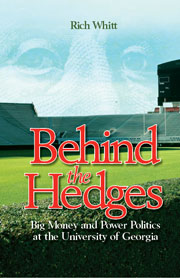Chuck Morgan, 78, one of the most colorful and powerful legal advocates for civil rights in the 1960s, died January 8, 2009, of complications of Alzheimer’s disease. He “died peacefully at his Destin, Fla., home,” the local newspaper reported. I hope that was so, and if it was, then it was one of the few things Chuck ever did “peacefully.” He was a larger-than-life personality who not only recognized the injustices in society but did something about them. There’s a good story by Roy Reed in the New York Times about Chuck’s passing.
NewSouth’s author Bob Zellner also wrote movingly about Chuck in The Wrong Side of Murder Creek. Here’s a passage from the book:
The everyday slog and the relentless work load could get us down, so spirits always soared when outside help arrived to reinforce what we already knew—that what we were doing was important and that the word was getting out up North. The joy was even greater when the help came from a progressive Southern lawyer, who by definition had to be both courageous and slightly crazy to get involved in civil rights cases. One such lawyer was the outspoken Charles Morgan Jr. from rough-tough Birmingham. Victor was already comfortable with our legal standing, assuring us that the Bill of Rights applied even in the primitive backwoods courts of darkest Alabama. What Big Chuck brought was joie de vivre and utter fearlessness. Chuck was not bashful about letting the courthouse thugs and hangers-on know that he was onto their game. He’d been to enough rural courtrooms in Alabama to know that the “Courthouse Gang” was there to prop up the powers that be by hanging around to whittle sticks, spit tobacco, and glare menacingly—we called it “the hate stare”—at outsiders or anybody else the sheriff and the judge didn’t like.
Morgan went about his work in Talladega with such gusto that we felt less stressed. After court we gathered around him in his tiny motel room as he spun hilarious yarns of past exploits. “The other day,” Chuck said, “I had to go down to Greene County—that’s in the Black Belt—where I’m defending a poor black man. I told Camille, my wife, I might not make it back if the rednecks down there know about me ranting up here in Birmingham against Bull Connor. When she asked if I really had to go, I told her yes, if this man is to escape spending the rest of his natural life in jail for just trying to register. ‘What’d they charge him with?’ my wife asked. I told her it was carnal knowledge of a chicken, a tough charge to defend against.”
From the center of his sagging bed Morgan would lean over and put down his sweating glass of iced bourbon and branch water. He’d grab the phone and call the respected journalist Claude Sitton at the New York Times. “Claude, I got a report from the front.” Pause. “What do you mean what front? It’s the only front that matters right now—Morgan defending Zellner, the Bradens, and now Rabinowitz and Madame Grant—nothing but me standing betwixt them and the benighted lawlessness of the Great State of Alabama! My favorite kind of story, Mr. Sitton.” Another pause. “Sir, it certainly is news that’s fit to print. You ought to be down here to see it for yourself, but since you ain’t, let me tell you about it in living color.” Sitton was an Atlantan and the NYT’s chief Southern correspondent. He reported widely on civil rights from 1958–64. Morgan’s bantering with him was partly for our entertainment and also to make sure that our activities would stay in the national focus, thus bringing additional support and some measure of protection.
Rabinowitz and Grant had been added to the injunction when they showed up for my hearing. By the second or third day of the hearing, Morgan and Rabinowitz, with help from another volunteer attorney, Arthur Kinoy (later a co-founder of the Center for Constitutional Rights), had prepared a countersuit against the state of Alabama, Talladega County, et al. That morning our group, led by Morgan, had woven our way through the usual crowd of whittlers and spitters outside the courthouse. Inside, Chuck motioned for me to follow him down the stairs. We marched into the basement where many county employees worked, and he announced loudly with a big smile, “Mr. Zellner and I have just accused all of y’all of being white.”
Most of the time things in SNCC were so hectic and our lawyers were so busy trying to keep us out of jail or getting us out of jail that there was no time for preparing proactive suits. In Talladega, however, we were lucky to have these feisty attorneys working for us. So when Morgan impishly accused all the county employees of being white, he was deadly serious. Our counter-injunction asked the federal government to ban segregated courtrooms, all-white juries, and all-white judges and sheriffs. Morgan and Rabinowitz asked that all proceedings against civil rights workers and black voter registration aspirants be removed to federal courts.
The very next morning our entry into the courthouse changed dramatically. As Chuck and I approached the front steps and the waiting courthouse gang, he simply pushed his seersucker jacket aside just enough to reveal a huge gun snugly nestled in a beautiful brown leather shoulder holster. The gang parted like the Red Sea for Moses, and we sailed peacefully into the courthouse. As it turned out, Chuck was friends with the sheriff and had cleared this ploy in advance, but at the time his only comment was, “Zellner, maybe you know how to be nonviolent and survive. My mama told me, ‘Son, walk loudly and carry a big piece.’”
We were sworn to nonviolence in all our public affairs, but . . . we were kicking ass in the courtroom and it seemed that Charles Morgan Jr., Esquire, of Birmingham, was prepared to kick it on the courthouse lawn if push came to shove.
And another passage from the same book:
Wallace and his prosecutors were delighted with the prospect of trying me on something other than the political charge of conspiracy. Conspiring to do what? They had no evidence of plans to demonstrate at Wallace’s inaugural. So their Plan B was to convict Zellner on a bad check charge and send him to the penitentiary for ten years. Maybe he wouldn’t survive the Alabama prison system!
Chuck Morgan assisted Clifford Durr at my trial. Clifford in frail health and was exhausted, and Morgan was always spoiling for a civil rights legal fight. I remember at one point coming out of the courtroom and I had a cigarette in my hand and my hands were cuffed in front of me, and the photographer was there, and I didn’t expect the photographer, so I smiled and he took the picture. Chuck told me later, “No matter if you are acquitted or convicted or there’s a hung jury, never smile when you come out of the courtroom, because you weren’t supposed to be arrested to begin with.”
When they took me to the jail, I guess it was the same jail Rosa Parks had been in, and Martin Luther King, and even Hank Williams a time or two. One of my classmates from Huntingdon was the brand new jailer. The newsmen interviewed him, and they asked how it felt to lock up his old classmate, Bob Zellner. I wasn’t treated badly at all.
Cliff and Chuck had a good defense for the all-white, mostly male Montgomery jury. The prosecution said that I had purchased a camera for $85 from the pawn shop on Friday afternoon. Because I traveled so much, my SNCC paycheck was automatically deposited in Atlanta each week. The police wouldn’t let Mr. Erlich, the shop owner, deposit my check. Instead, the cops called the bank in Atlanta to see what my checking account balance was and were told that at the moment there was less than $85. But they were also told that the bank knew the account and knew that a deposit was made each Friday. The bank said the check would be honored. Nevertheless, that was the state’s case against me.
“The check,” Mr. Durr argued, “could not be evidence of false pretenses since it was never presented for payment, nor was it ever returned for insufficient funds.” The prosecutors could not have it both ways. In closing arguments, Morgan marched his ample frame up and down in front of the hometown jury, waxing homespun as he asked each juror, “How many times have you, or your spouse, bought groceries on Friday based on the family paycheck that was to be deposited that afternoon?”
Then in summation, Clifford Durr, as courtly a Southern gentleman as anyone ever saw, rail thin in his crisp seersucker suit and bending slightly forward because of his bad back, delivered the final blow. He asked the jurors, “How would you feel if the Governor or the police were mad at you and took the check out of your grocer’s hand, called your bank and then tried to put you in jail for ten years because someone at the bank said you didn’t have enough money?”
However, long before Cliff drove these last nails into the coffin of Wallace’s case against me, Chuck had done something in open court that determined the outcome of the trial. It is rare that the opening shot is the one that decides the battle, but that is what happened. We had spent weeks asking the progressive ministers of the conference and their wives to attend my trial in support of a fellow Methodist in trouble because of an issue of conscience. We had asked them to be prepared to be called as character witnesses.
Mrs. Francis McLeod, the grande dame of Alabama Methodists and the mother of a brood of charismatic and successful preachers in our conference, agreed to lead the charge against the state for trying to imprison me for ten years. This famous Methodist momma was the mother of Dad’s best friend, Reverend Fletcher McLeod. Another son, Powers McLeod, was everybody’s pick to be bishop someday.
Chuck’s simple but brilliant maneuver, as the judge gaveled the crowded court session to order, caught everybody off guard. He stood and addressed the judge, “Your Honor, there are several preachers here with their wives who are character witnesses for my client, Mr. Bob Zellner. Mr. Durr and I have not had the opportunity to interview all of them. In the interest of saving the time of the court, if it please your honor, would you ask for them to stand so we may identify Mr. Zellner’s character witnesses? I don’t know how many of them are here.”
Before the prosecutor could object and before the judge realized he was being poleaxed in his own courtroom, the judge asked the character witnesses to stand. Almost the entire audience stood up. Case closed.
 Pulitzer Prize-winning journalist Richard Whitt died Monday, January 26, at his home in Marietta, Georgia, of a heart attack; he was 64. Rich was the author of Behind the Hedges: Big Money and Power Politics at the University of Georgia, forthcoming from NewSouth Books.
Pulitzer Prize-winning journalist Richard Whitt died Monday, January 26, at his home in Marietta, Georgia, of a heart attack; he was 64. Rich was the author of Behind the Hedges: Big Money and Power Politics at the University of Georgia, forthcoming from NewSouth Books.

